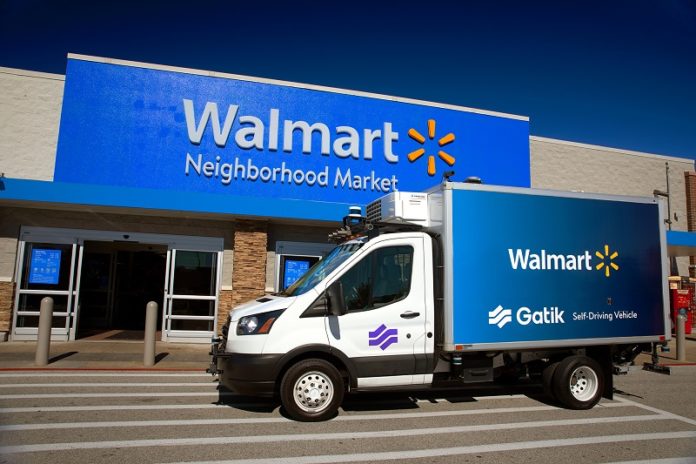A new era of transportation could come to Kansas with a proposal that would clear the way for retailer Walmart to employ driverless delivery trucks.
Walmart is partnering with a Gatik, a transportation technology company based in Palo Alto, California, to deploy a driverless fleet of box trucks that would deliver goods from a warehouse to a retail outlet.
It was not immediately known where Walmart plans to operate the vehicles, and a company lobbyist refused to immediately answer any detailed questions about the project after a legislative hearing on the proposal.
The driverless vehicles, traveling along fixed, repeatable routes, would still be subject to local traffic laws, but local governments would be barred from outlawing them in their community.
The vehicles would have to comply with federal law and federal motor carrier safety standards. They also would need to be insured. And the remote operator of the vehicle would have to be licensed.
The owner of the automated vehicle – in this case Gatik – would be considered the operator for purposes of traffic enforcement.
The bill before the Senate transportation committee would open the door to Walmart’s driverless vehicles by setting up a framework for how autonomous vehicles would be regulated in Kansas. It would apply to any service similar to what Walmart is proposing.
It is believed that Kansas is one of six states that do not have a law on the books regulating autonomous vehicles.
On Tuesday, the Senate transportation committee heard from supporters of the bill. A hearing for opponents is expected to be held Wednesday if weather allows.
Walmart has similar driverless operations in its corporate hometown of Bentonville, Arkansas, as well as Louisiana and Texas.
Walmart contracted with Gatik vehicles to deliver groceries from warehouses to specific retail outlets in and around Bentonville.
It’s been reported that there are two box trucks in operation in Arkansas.
And while there is no safety driver at the wheel, each has a manned emergency brake in the passenger seat and a companion vehicle monitoring it for any crashes.
The trucks, which weigh up to 26,000 pounds, reportedly follow a seven-mile loop daily for 12 hours a day in Arkansas.
The Arkansas Highway Commission approved Gatik’s autonomous box trucks late in 2020 after an 18-month pilot program with human backup drivers.
Walmart later expanded its driverless trucks to New Orleans where they follow a 20-mile route, delivering items from a Supercenter in the city to a Walmart pickup point in the suburbs where customers can retrieve their orders.
Gatik claims a clean safety record in the locations where its vehicles now operate in Louisiana and Arkansas as well as in Texas, where the Silicon Valley startup has an autonomous trucking hub that operates 20 hours a day, every day in Fort Worth.
Since it was founded in 2017, Gatik has reportedly raised $114.5 million from investors, partly with backing from Koch Disruptive Technologies.
Chase Koch, president of Koch Disruptive Technologies, told Forbes Magazine last year that “Gatik’s transformational autonomous technology and world-class team are defining the standard in B2B short-haul logistics by addressing the most prominent issues facing today’s supply chain.”
Richard Steiner, head of policy for Gatik, emphasized the struggling supply chain in making a case for the bill and the service Walmart wants to offer.
“This model has become increasingly important in today’s economy given that consumers want goods as quickly as possible in the safest and most efficient manner,” Steiner said.
“It’s an expensive and complicated portion of the supply chain, and so it’s made our solution particularly relevant and important, not the least with the events of the last couple years and the pandemic that we’ve all had to go through,” Steiner said.
“This is something Gatick has set about solving for,” he said.
Gatik has previously indicated that it can cut logistics costs by as much as 30% for a grocery store, an important point considering that groceries have thin profit margins.
Walmart has been employing Gatik’s autonomous vehicles as part of a transition to a so-called “hub and spoke” model for grocery delivery where warehouses are closer to the consumer and serve several retail stores.
Walmart is not new to autonomous deliveries.
Three years ago, Kroger supermarkets started testing autonomous delivery vehicles with start-up Nuro and has reportedly completed thousands of “last mile” deliveries to consumers in the greater Houston area.
Kroger is also using automated warehouses to launch online grocery delivery in Florida and other states where it does not have brick and mortar locations.
Another grocery chain, Albertsons, has tested “last mile” delivery with start-up Tortoise in Northern California.
Employees fill the the remote-controlled Tortoise carts at the store.
The carts are then operated remotely by “drivers” who use Xbox controllers to deliver products to the customer’s home.
This is not the first time that the Kansas lawmakers have considered bills that would allow advanced methods for delivering goods to consumers.
In recent years, the Kansas Senate has considered a bill authorizing Amazon to operate automated delivery vehicles on city sidewalks.
The bill was never been taken up by the full Senate after Democrats argued that the bill would steal jobs away from delivery drivers and concerns were raised about safety.
















